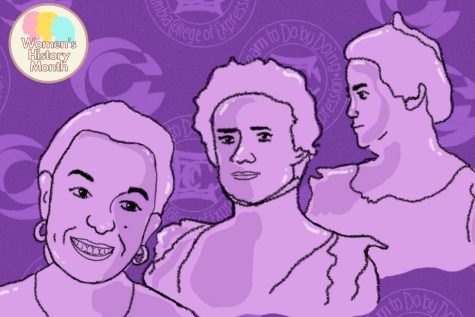Behind the curtain: Three women who shaped Columbia’s history
March 25, 2022

Deep in the roots of Columbia’s history, it was three women — Mary A. Blood, Ida Morey Riley and later Jane Alexandroff — whose leadership and work as founders and pioneers in their field shaped the college into what it is today.
Columbia started as the Columbia School of Oratory in 1890, founded by Blood and Riley, who were both instructors and graduates of Emerson College. The two women had a vision to teach public speaking, among other subjects, using principles they learned from their education during a time when women were considered “second-class citizens” and rarely had the chance at a college education, according to “A Different Drummer” by Mike Alexandroff.
“Columbia’s bloodline was surely begun by eminently brave and intelligent souls,” Alexandroff wrote in “A Different Drummer.”
Blood and Riley had a strong network behind them, including the Women’s Christian Temperance Union, which helped the two women start Columbia. WCTU played a part in furthering women’s roles in society.
During Blood’s tenure, Columbia kept a statement of mission that described the college as “a school for character building and preparation for life,” along with a mission to “learn to do by doing.”
“Blood also worked at Eliot School in Boston for a number years … [where] they taught home arts, crafting, sewing, cooking and hands-on things, which I thought was fascinating since everything at Columbia is hands-on,” said Heidi Marshall, head of Archives and Special Collections at Columbia.
Before Columbia would change its name to Columbia College of Expression in 1904, Riley died unexpectedly at the age of 45 in 1901. Blood remained the president of Columbia until her death in 1927 at the age of 78, when she died while at the school due to heart disease.
Down the line in Columbia’s history, Jane Alexandroff, the first lady of Columbia during her husband Mirron “Mike” Alexandroff’s presidency from 1961 to 1992, was also an influential part of the school. Serving first as the only full-time staff member from 1955 to 1961, Jane Alexandroff later took on a bigger role in an administrative position in Columbia’s development, helping lead the school when Mike Alexandroff spent four months in a tuberculosis sanitarium.
“The fact that Columbia College exists at all is a testament to my mother almost exclusively,” said Norman Alexandroff, former communications specialist at the Columbia library, among other roles, and son of Mike and Jane Alexandroff.
Norman Alexandroff said during a time when Columbia was “trying to survive from one semester to another,” his father was planning to give up on the school until Jane talked Mike into keeping Columbia open based on the opportunities it provided to women, minorities and low-income students in the arts and communications fields.
In honor of Jane, who passed away in 1996, Norman Alexandroff started the Jane Ann Legnard Alexandroff Endowed Scholarship for Social Change, awarded to a full-time undergraduate student who works toward social justice through their creative work.
In 1987, Jane Alexandroff founded the Chicago Artists Abroad program at the college, which provided grants allowing Chicago artists to perform and exhibit work outside the U.S.
In 1991 Lois Weisberg, at the time Chicago’s commissioner of the Department of Cultural Affairs, called Jane Alexandroff “a shining example of how one person with a vision can make it happen.”
Albert Williams, associate professor of instruction in the Theatre Department, described Jane as the “First Lady” of Columbia when he attended as a student in the 1970s and when he started teaching in the 1980s.
“She was a gracious, warm, down-to-earth, intense, exciting, smart person, very much her husband’s partner in building Columbia College up as a major cultural force in Chicago,” Williams said.
Jane Alexandroff, a civil rights activist, joined the fight for women’s rights and equality and was the “mother” of Columbia, as her son calls her.
“She knew everybody by their first name,” Norman Alexandroff said. “She helped create a family environment, which again, helped the college survive in a period of uncertain economic adventures.”
As the Columbia College Chicago community celebrates Women’s History Month, it can reflect on the extraordinary contributions of these three women — Mary A. Blood, Ida Morey Riley and Jane Alexandroff — and the essential roles they played in impacting the college experience of each person who has passed through the doors of the institution.







